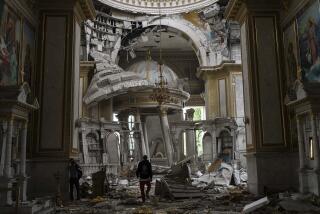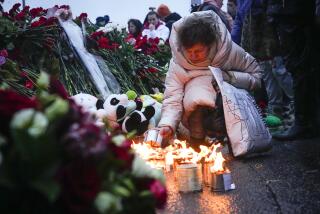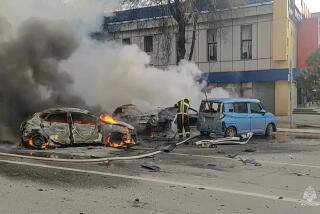Lenin statue toppled in huge Ukraine protest
KIEV, Ukraine — Protesters toppled a monument to Bolshevik leader Vladimir Lenin on Sunday during the biggest march and rally in central Kiev since President Viktor Yanukovich galvanized his opposition by turning down a trade deal with the European Union.
The Ukrainian protesters blocked and barricaded government offices and said they were giving Yanukovich 48 hours to disband his government before they would march on his country residence near Kiev.
In turning down the trade deal with the EU, Yanukovich was effectively asserting that Russia remained Ukraine’s key trade partner. The country is politically and geographically divided, to some extent, between those who favor ties to Russia and those who would like to see Ukraine more aligned with Western Europe.
That gave the toppling of the Lenin statue particular significance — despite the fact that most Lenin statues in Russia itself were torn down during the collapse of the Soviet Union in 1991. Statues of the Soviet leader were once ubiquitous throughout the East bloc.
No police officers could be seen anywhere in the vicinity of Taras Shevchenko boulevard where the granite and marble monument was brought down by a group of young protesters.
“It is amazing how the authorities allowed Lenin to go down!” said Sergei Andriyenko, a 51-year-old Kiev businessman who applauded the action. “Where were the police, where were the communists who were always protecting him?”
A young man climbed the empty base of the statue Sunday evening and was brandishing a Ukraine national flag as a crowd of several hundred young protesters chanted “Way to go!” and some young men crushed the fallen communist idol with sledgehammers.
The protests Sunday were the largest since the 2005 Orange Revolution in Ukraine. Although crowd estimates varied widely — from an official police estimate of 50,000 to rally organizers’ claims of up to 1 million — the turnout seemed clearly larger than for a demonstration the previous Sunday that was officially calculated at 300,000.
Despite its leaders’ claims that their protest is and will remain peaceful, the toppling of the historic monument could hurt the opposition, said Vadim Karasyov, director of Global Strategies Institute, a Moscow-based think tank.
“Half the population of Kiev are Russian speakers and a majority of the elderly still have respect for Lenin,” Karasyov said in an interview. “I am afraid this action could be a provocation designed to present protesters as vandals and hooligans and thus build up basis to introduce a state of emergency in Ukraine.”
Opposition leaders were also warning their followers that the Yanukovich administration might try to introduce a state of emergency.
“We are officially addressing President Viktor Yanukovich: attempts to declare a state of emergency are nothing but a state coup,” opposition leader Arseny Yatsenyuk told reporters at a briefing Sunday.
Another foe of the president, Sergei Pashinsky, told reporters that if Yanukovich doesn’t dissolve his government within 48 hours, the opposition will send groups of protesters to block his country residence. Yanukovich was reportedly staying there after returning from a meeting with Russian President Vladimir Putin in Sochi, Russia, over the weekend.
Yanukovich had no public response Sunday but a lawmaker from his party warned that the authorities are ready to take resolute actions.
“We understand the goals of the opposition, which wants to discredit the authorities and the president,” Yevgeny Balitsky, a member of Yanukovich’s Party of Regions, said to UNIAN, a Ukranian news organization. “We are saying a resolute ‘no’ to such actions and will be opposing them within the constitutional framework and in accordance with the laws of our country.”
ALSO:Tragedy dogged the triumphant Nelson Mandela
Iran deal could allow peaceful nuclear program, Obama says
Former Mexican governor indicted by U.S. on drug trafficking charges
sergei.loiko@latimes.com
Special correspondent Butenko reported from Kiev and staff writer Loiko from Moscow.
More to Read
Start your day right
Sign up for Essential California for news, features and recommendations from the L.A. Times and beyond in your inbox six days a week.
You may occasionally receive promotional content from the Los Angeles Times.






